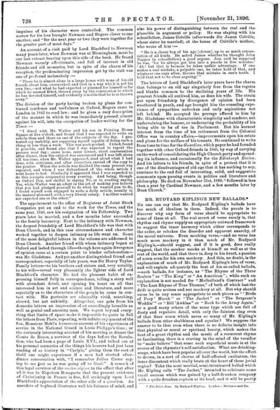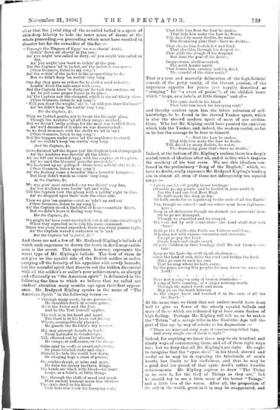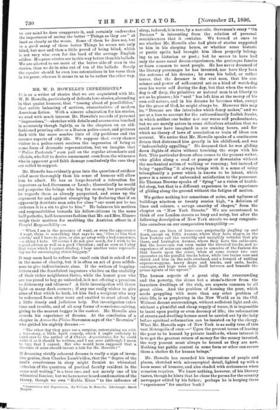MR. RUDYARD KIPLING'S NEW BALLADS.*
No one can say that Mr. Rudyard Kipling's ballads have too much of idealism in them. Indeed, the puzzle is to discover why any form of verse should be appropriate to some of them at all. The real secret of verse surely is, that rhythm and rhyme supply an appropriate outward framework to suggest the inner harmony which either corresponds to the order, or rebukes the disorder and apparent anarchy, of the moral universe. Even mocking verse,—and no verse has much more mockery in it than much of Mr. Rudyard Kipling's,—should suggest, and if it is good, does really suggest, that the mocker mocks at himself as well as at the rest of the world, and that there ie, deep in his heart, a passion of scorn even for his own mockery. And this, no doubt, is the explanation of much of Mr. Rudyard Kipling's love of verse, and will explain adequately the best of his so-called ballads,. —such ballads, for instance, as "The Rhyme of the Three Sealers" or "The King" or "An American"; while such as explanation is not needed for " Mulholland's Contract" and " The Last Rhyme of True Thomas," of both of which last the drift is quite serious and not mockery at all. But why should verse be in any sense appropriate to such pieces as " Birds. of Prey' March" or "The Jacket" or "The Sergeant's Weddin' " or " Bill 'Awkins" or " Back to the Army Again," or a good many others of the same type which are full of dusty and repulsive detail, with only the faintest ring even of that finer scorn which saves so many of Mr. Kipling's ballads from utter shabbiness and squalor P We suppose the answer to be that even when there is no definite insight into that physical or moral or spiritual beauty, which makes the beat of a great rhythm and the music of a recurrent rhyme so fascinating, there is a craving in the mind of the versifier to " make believe" that some such superficial music is at the source of the rhymster's self-satisfaction. What are drinking- songs, which have been popular all over the world, but the effort to drown, in a sort of chorus of half-affected exultation, the inner discontent which really beats at the heart of these jovial orgies? Take the semi martial, semi-intoxicated ballad which Mr. Kipling calls " The Jacket," intended to celebrate some small success which was gained by a half-drunken company with a quite drunken captain at its head, and it will be pretty • The Seven Sean, By Endyard Kipling,. London : MethnEn and Co.
clear that the jovial ring of the so-called ballad is a spurt of skin-deep hilarity to hide the inner sense of shame at the whole proceeding,—a proceeding which must have resulted in disaster but for the cowardice of the foe
"Through the Plagues of Egyp' we was chasin' Arabi, Gettin' down an' shovin' in the sun ; An' you might 'ave called us dirty, an' you might 'ave called us
dry, An' you might 'ave 'eard us talkin' at the gun.
But the Captain 'ad 'is jacket, an' the jacket it was new- ('Orse Gunners, listen to my song !) An' the wettin' of the jacket is the proper thing to do, Nor we didn't keep 'im waitin' very long.
One day they gave us orders for to shell a sand redoubt, Loadin' down the axle-arms with case; But the Captain knew 'is dooty, an' he took the crackers out An' he put some proper liquor in its place.
An' the Captain saw the shrapnel, which is six•an'-thirty clear. ('Orse Gunners, listen to my song !)
4 Will you draw the weight,' sez 'e, or will you draw the beer ? ' An' we didn't keep 'im waitin' very long.
For the Captain, 4-c.
Then we trotted gentle, not to break the bloomin' glass, Though the Arabites 'ad all their ranges marked; But we dursn't 'ardly gallop, for the most was bottled Bass, An' we'd dreamed of it since we was disembarked : So we fired economic with the shells we 'ad in 'and, ('Oree Gunners, listen to my song !) But the beggars under cover 'ad the impidence to stand, An' we couldn't keep 'em waitin' very long.
And the Captain, etc.
So we finished 'arf the liquor (an' the Captain took champagne), An' the Arabites was shootin' all the while;
An' we left our wounded 'appy with the empties on the plain, An' we used the bloomin' guns for projectile !
We limbered up an' galloped—there were main.' else to do- ("Orse Gunners, listen to my song !)
An' the Battery came a•boundin' like a boundin' kangaroo, But they didn't watch us comin' very long.
As the Captain, 4c.
We was goin' most extended—we was drivin' very fine, An' the Arabites were loosin"igh and wide, Till the Captain took the glassy with a rattlin' right incline, An' we dropped upon their 'eads the other side.
Then we give 'em quarter—such as 'adn't up and cut ('Orse Gunners, listen to my song !), An' the Captain stood a limberfal of lizzy—somethin' Brett, But we didn't leave it fizzing very long.
For the Captain, c-c.
We might ha' been court-martialled, but it all come out all right When they signalled us to join the main command.
There was every round expended, there was every gunner tight, An' the Captain waved a corkscrew in 'is 'and But the Captain 'ad 'is jacket, 4-c."
And there are not a few of Mr. Rudyard Kipling's ballads of which such eagerness to drown the truth in devil-may-carish- ness is the secret. This specimen, however, represents the worst type of Mr. Kipling's ballads. The best of them do not give us the squalid side of the British soldier or sailor, carrying off the ferocity of his appetites with rowdy bravado, but the scornful spirit that dissects out the hidden discontent with all the soldier's or sailor's poor achievements, as sharply and effectually as "the American spirit" is delineated in the following fine lines to which we believe that we called our readers' attention many months ago upon their first appear- ance. Mr. Rudyard Kipling speaks in the name of "The American Spirit " in the following verses :-
" Chrough many roads, by me possessed, He shambles forth in cosmic guise; He is the Jester and the Jest,
And he the Text himself applies.
The Celt is in his heart and hand, The Gaul is in his brain and nerve; Where, cosmopolitanly planned, He guards the Redskin's dry reserve.
His easy unswept hearth he lends
From Labrador to Guadeloupe ; Till, elbowed out by sloven friends, He camps, at sufferance, on the stoop.
Calm-eyed be scoffs at sword and crown, Or panic-blinded stabs and slays : Blatant he bids the world bow down, Or cringing begs a crust of praise; Or, sombre-drunk, at mine and mart, He dubs his dreary brethren Kings. His hands are black with blood—his heart
Leaps, as a babe's, at little things.
But, through the shift of mood and mood, Mine ancient humour saves him whole— The cynic devil in his blood That bids him mock his hurrying soul ; That bids him flout the Law he makes, That bids him make the Law he flouts, Till, dazed by many doubts, he wakes The drumming guns that—have no doubts ; That checks him foolish-hot and fond, That chuckles through his deepest ire, That gilds the slough of his despond But dims the goal of his desire ; Inopportune, shrill-accented, The acrid Asiatic mirth That leaves him, careless 'mid his dead,
The scandal of the elder earth."
That is a true and masterly delineation of the high-falatin' conceit, of the petty vanity, of the blatant passion, of the imperious appetite for praise (not happily described as " cringing " for "a crust of praise"), of the childish heart which " leaps, as a babe's, at little things," and of- " The cynic devil in his blood
That bids him mock his hurrying soul," and thereby confers upon him the bitter salvation of self- knowledge, to be found in the shrewd Yankee spirit, which is also the shrewd modern spirit of most of our civilisa- tions. Who but Mr. Kipling could have painted the cynicism which bids the Yankee, and, indeed, the modern realist, so far as he has the courage to be true to himself, "—flout the Law he makes, That bids him make the Law he flouts, Till, dazed by many doubts, he wakes The drumming guns that—have no doubts."
Indeed, at the bottom of Mr. Kipling's realism there is a deeply seated touch of idealism after all, and it is this which inspires the mockery of his best verse. We see this idealism con- fessed in the preliminary " Song of the English," which, we have no doubt, really expresses Mr. Rudyard Kipling's leading aim in almost all even of those not infrequently too squalid songs " Fair is our la-0 goodly is our heritage !
(Humble ye, my people and be fearful in your mirth !)
For the Lord our God Most High He hath made the deep as dry, lie hath smote for us a pathway to the ends of all the Earth !
Yea, though we sinned—and our rulers went from righteous- ness—
Deep in all dishonour though we stained our garments' hem. Oh be ye not dismayed, Though we stumbled and we strayed, We were led by evil counsellors—the Lord shall deal with • hem !
Hold ye the Faith—the Faith our Fathers sealed us; Whoring not with visions—overwise and overstate. Except ye pay the Lord Single heart and single sword, Of your children in their bondage shall Ho ask them treble- tale !
Keep ye the Law—be swift in all obedience—
Clear the land of evil, drive the road and bridge the ford. Make ye sure to each his own That he reap where he hath sown ; By the peace among Our peoples let men know we serve the Lord!
Hear now a song—a song of broken interludes—
A song of little cunning; of a singer nothing worth. Through the naked words and mean May ye see the truth between
As the singer knew and touched it in the ends of all the the Earth ! "
At the same time we think that our author would have dune well to give us fewer of the utterly squalid ballads and more of those which are redeemed by at least some flashes of high feeling. Perhaps Mr. Kipling will tell us, as he makes the "Totem" of a savage tribe in the Neolithic Age tell the poet of that age by way of rebuke to his dogmatism :— -" There are nine and sixty ways of constructing tribal lays, And every single one of them is right."
Indeed, for anything we know there may be six hundred and ninety ways of constructing them, and all of them right ways too; but we deny that all Mr. Kipling's are right. He ought to recognise that the "cynic devil" in his blood, shrewd and useful as he may be in exposing the falsehoods of men's hearts, has limits to his usefulness, and that he may be a good deal too proud of that cynic devil's rather bumble achievements. Mr. Kipling aspires to draw " The Thing as he sees it, for the God of Things as they are," but he should try to see a little more of the better "Things," and a little less of the worse. After all, the proportion of the evil in the world, great as it is, may be exaggerated, and to our mind he does exaggerate it, and certainly underrates the importance of seeing the better "Things as they are" at least as clearly as the worse. Some of them he does see, but to a good many of these better Things he seems not only blind, but now and then a little proud of being blind, which is not very wise even for the bard of the average English soldier. His prose stories are in this way better than his ballads. We are allowed to see more of the better side of man in the stories, than we do in nine out of ten of the ballads. Surely the squalor should be even less ostentatious in his verse than in his prose, whereas it seems to us to be rather the other way.
























































 Previous page
Previous page